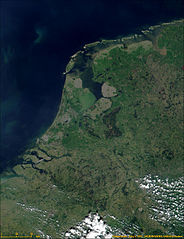The Dutch workforce works the least among the world's industrialized nations: it averages 29 hours a week - according to the OECD - with an average annual income of $47,000.
CNN reports that Americans work 38 hours a week at an average annual income of $54,000.
Besides Holland, the other nine countries with shorter work hours than the U.S. are: Denmark (33 hours, $46,000); Norway (33 hours, $44,000); Ireland (34 hours, $51,000); Germany (35 hours, $40,000); Switzerland (35 hours, $50,000); Belgium (35 hours, $44,000);Sweden (36 hours, $38,000); Australia (36 hours, $45,000) and Italy (36 hours, $34,000.)
It's interesting to follow the ensuing conversation on CNN's website with its usual cliche-driven remarks, such as:
"And then "smart" Americans claim socialism doesn't work! People in these
countries all work less, make more and have all kinds of benefits and
these are countries doing great economically as well. Let me live in the
land of the free, work 60hrs a week for low wages, no vacation and no
benefits while being watched by my government. " (by Mbane)
and
"we work a few more hours, yet make substantially more before taxes and a
ton more after taxes. yet, somehow a country with a population of Los
Angeles is 'better' because they make significantly SIGNIFICANTLY less
money than we do on average? what?" (by Virtually Real)
and ""People in these countries are healthier, live longer, live in far
better housing,
are better educated (without life long debt) and travel
more." This is all based on an "average" person--a statistical person.
This is socialism. A Scandinavian who is denied cutting-edge treatment
for an exotic cancer and dies does not care about the long average
lifespan of his fellow countrymen. The average Scandinavian house is
adequate, but many Americans who have traveled to Scandinavia find the
houses to be small and plain. Scandinavians travel more, but many
Americans are content not to travel much. Like you, I recognize the
upside of a European lifestyle, but I prefer America, where, if I happen
to want treatment at the world's top hospitals, a huge house, or
whatever else I have led myself to believe makes me happy, I have the
opportunity to work hard and achieve it. In the US we have opportunity,
not socialism." (by Lobelia)
This kind of discussion is beside the point. First, I would add that one shouldn't put too much stock in numbers and comparisons. It's not whether these numbers show which country is "better", it's whether people are happy and prosperous in their own country and possibly could learn something from other countries. If the Dutch are happy working fewer hours, with sufficient income and leisure time, that's their choice and fine for them. If the Italians don't like their tax system, then they can vote hopefully for a change in policy. If Americans like to travel in Europe in high-speed trains, but are happy living without those amenities in the U.S., then they are entitled to their choice. However, each of them, and especially their economists and politicians, could start wondering how come the Europeans have great railway transportation, why the American make more money, or how come the Dutch can afford to have so many days off etc. etc. In short, it's about learning that each society and culture may have different preferences, but also might offer suitable role models to learn from.

No comments:
Post a Comment